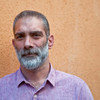For peace, once again
Last week marked the fourth anniversary of the Ankara Train Station massacre. The pain caused by the hundreds of dead and injured subsists. The victims simply demanded peace. But they paid a high price for it.
Last week marked the fourth anniversary of the Ankara Train Station massacre. Killing more than one hundred people and injuring more than five hundred, the event went down as the deadliest terror attack in modern Turkish history. The pain of the hundreds of people dead and wounded at a meeting about peace on 10 October 2015 will forever subsist. These victims were simply asking for peace. Yet they paid a high price for their actions.
In Turkey, the request for social peace has long been has treated with suspicion. Throughout the years, we have undergone periods when this request was subject to heavy pressure. And the pressure exerted by the judiciary mechanisms - one of the state's power tools - is rising.
In the wake of the September 11 attacks in the U.S., safety concerns began to shape international relations. States started to label their very own citizens as potential terrorists and diminished their basic rights.
An atmosphere of social paranoia was stirred so as to uphold security policies and legitimize the states's struggle against its own citizens. As citizens, we became objects of security policies. A feeling of insecurity was fueled in the name of security. While some people's religious beliefs became the reasons of a potential threat, others were targeted for their ethnicity or sexual identity. It became such that everyone saw his or her other as a possible terrorist. This entails estrangement and alienation. It means many of our daily interactions are conducted in more aggressive tone. It implies being ready to fight at any moment.
The suicide bombing that was carried out in Ankara on 10 October 2015 caused an unmatched amount of pain and suffering. It should have led us to question all of the above. Instead, we abstained from any such questioning.
The military operation Turkey has launched in Syria's North and its approval by the political opposition is enduring proof of this. Those blessing the operation do not seem to see a contradiction between engaging in war whilst calling for a dialogue. The fact that the opposition follows the government once more due to "security" concerns demonstrates how scared they are of it.
The operation, or whatever you want to call it, is war. And a bullet will take lives no matter which side it comes from.
We have become an isolated, divided and hopeless society whose political opposition is so scared it wittingly endorses the government's strategy to retain power by opening up new profitable areas in a foreign country drawing on the pretexts "security" and "counter terrorism". With an opposition that has surrendered itself to such a discourse of security, is social peace even possible?
In this nationalism-obsessed country, the Kurdish issue is somewhat of a test. Whenever a Kurdish-related problem comes up, the true color of our politics actors is unveiled. Our so-called "leftist" main opposition party, the Republican People's Party (CHP), is so scared of being seen next the pro-Kurdish Democratic People's Party (HDP), it refuses to see the Kurdish issue beyond the frame of terrorism and chooses to ignore the real reasons behind Turkey's presence in Syria. In that respect, it surpasses many of the world's right-wing parties when it comes to nationalism and patriotism.
The CHP does not even make half the effort to pretend it is a left wing party. And of course there is the fear of Erdoğan himself, on top of that. This is cowardice. The party effectively stands in the ranks of those who consider demands for peace as threats, instead emphatically stating that "Nothing else matters when it comes to our country". They forget that this "nothing else" is in fact the lives of ordinary people. By blessing death, they are destroying hope. Giving in to this nationalist blindfold on the anniversary of the Ankara Station massacre where hundreds were killed is akin to mocking us.

